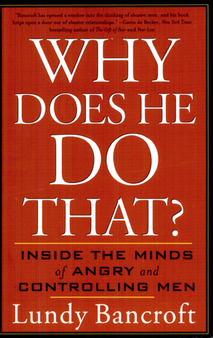 I happened to be scrolling through Instagram and found this excerpt split into quite a few Insta pages. I wanted to share it because I believe it is one of the most accurate, all-encompassing descriptions about chronic mistreatment in relationships that I've ever read. Why Does He Do That? By Lundy Bancroft Excerpt: One of the obstacles to recognizing chronic mistreatment in relationships is that most abusive men simply don’t seem like abusers. They have many good qualities, including times of kindness, warmth, and humor, especially in the early period of a relationship. An abuser’s friends may think the world of him. He may have a successful work life and have no problems with drugs or alcohol. He may simply not fit anyone’s image of a cruel or intimidating person. So when a woman feels her relationship spinning out of control, it is unlikely to occur to her that her partner is an abuser. The symptoms of abuse are there, and the woman usually sees them: the escalating frequency of put-downs. Early generosity turning more and more to selfishness. Verbal explosions when he is irritated or when he doesn’t get his way. Her grievances constantly turned around on her, so that everything is her own fault. His growing attitude that he knows what is good for her better than she does. And, in many relationships, a mounting sense of fear or intimidation. But the woman also sees that her partner is a human being who can be caring and affectionate at times, and she loves him. She wants to figure out why he gets so upset, so that she can help him break his pattern of ups and downs. She gets drawn into the complexities of his inner world, trying to uncover clues, moving pieces around in an attempt to solve an elaborate puzzle. The abuser’s mood changes are especially perplexing. He can be a different person from day to day, or even from hour to hour. At times he is aggressive and intimidating, his tone harsh, insults spewing from his mouth, ridicule dripping from him like oil from a drum. When he’s in this mode, nothing she says seems to have any impact on him, except to make him even angrier. Her side of the argument counts for nothing in his eyes, and everything is her fault. He twists her words around so that she always ends up on the defensive. As so many partners of my clients have said to me, “I just can’t seem to do anything right.” At other moments, he sounds wounded and lost, hungering for love and for someone to take care of him. When this side of him emerges, he appears open and ready to heal. He seems to let down his guard, his hard exterior softens, and he may take on the quality of a hurt child, difficult and frustrating but lovable. Looking at him in this deflated state, his partner has trouble imagining that the abuser inside of him will ever be back. The beast that takes him over at other times looks completely unrelated to the tender person she now sees. Sooner or later, though, the shadow comes back over him, as if it had a life of its own. Weeks of peace may go by, but eventually she finds herself under assault once again. Then her head spins with the arduous effort of untangling the many threads of his character, until she begins to wonder whether she is the one whose head isn’t quite right. To make matters worse, everyone she talks to has a different opinion about the nature of his problem and what she should do about it. Her clergyperson may tell her, “Love heals all difficulties. Give him your heart fully, and he will find the spirit of God.” Her therapist speaks a different language, saying, “He triggers strong reactions in you because he reminds you of your father, and you set things off in him because of his relationship with his mother. You each need to work on not pushing each other’s buttons.” A recovering alcoholic friend tells her, “He’s a rage addict. He controls you because he is terrified of his own fears. You need to get him into a twelve-step program.” Her brother may say to her, “He’s a good guy. I know he loses his temper with you sometimes—he does have a short fuse—but you’re no prize yourself with that mouth of yours. You two need to work it out, for the good of the children.” And then, to crown her increasing confusion, she may hear from her mother, or her child’s schoolteacher, or her best friend: “He’s mean and crazy, and he’ll never change. All he wants is to hurt you. Leave him now before he does something even worse.” All of these people are trying to help, and they are all talking about the same abuser. But he looks different from each angle of view. The woman knows from living with the abusive man that there are no simple answers. Friends say: “He’s mean.” But she knows many ways in which he has been good to her. Friends say: “He treats you that way because he can get away with it. I would never let someone treat me that way.” But she knows that the times when she puts her foot down the most firmly, he responds by becoming his angriest and most intimidating. When she stands up to him, he makes her pay for it—sooner or later. Friends say: “Leave him.” But she knows it won’t be that easy. He will promise to change. He’ll get friends and relatives to feel sorry for him and pressure her to give him another chance. He’ll get severely depressed, causing her to worry whether he’ll be all right. And, depending on what style of abuser he is, she may know that he will become dangerous when she tries to leave him. She may even be concerned that he will try to take her children away from her, as some abusers do. How is an abused woman to make a sensible picture out of this confusion? How can she gain enough insight into the causes of his problem to know what path to choose? The questions she faces are urgent ones. ABOUT THE AUTHOR For over twenty years Lundy Bancroft, the author of the national bestseller Why Does He Do That?, has specialized in counseling men who are unhealthy relationship partners, helping them make lasting changes. He is a former codirector at Emerge, the nation's first program for abusive men. http://lundybancroft.com
0 Comments
A dear friend called yesterday to chat about a friend of hers who was going through a lot of what I endured a year ago. She was being harrassed by her ex-husband to the point she filed for a restraining order. What struck me was the fact that in many states—her state, as well—evidence of physical abuse is the only type of evidence admissible in court. Thankfully, even though the evidence didn't show "physical" abuse, the judge granted a restraining order. It's widely known that many who verbally and emotionally abuse progress to some sort of physical abuse. It was something MANY loved ones in my life were very concerned about with regards to what I allowed and endured for three years. I can't say I didn't worry about it, as well. I did. I can count at least five women I know in the US right now who recently sat in front of a judge, pleading the case for protection, and worried whether or not they would get it. I was one of those women. What I've learned through this process (and through talks with other women dealing with verbal and emotional abuse) is the burden of proof is always on the woman. I was lucky because R decided to send emails sharing my blog post about our relationship to the president of the university where I work, as well as about 50 others whom I'm guessing he thought were part of HR but were actually part of a group called IHD, Institute for Human Development. His intention, of course, was to get me fired from my job for openly sharing details of our relationship including how we met, and what transpired. He also threatened in a direct email to me to "not stop until he had justice, " because I was speaking out about the abuse like none before me had done. This evidence was essential to outcome of my case. Had I not had this in writing, it would have made things much more difficult. What surprised me most is that the police report documenting a domestic violence call where the maintenance man in our apartment complex called law enforcement after hearing him yelling at me and hearing me crying was not admissible. The reason, the judge cited, was because the event occured more than a year before I showed up in court. My mind was blown. So let's say you have a DV report for physical abuse, in AZ, it would not be accepted as proof if it happened over a year ago. It's really difficult for many survivors (me, included) to get to the point of entering the court system for a number of reasons, so to punish them for a lapse in time makes no sense to me and is contributing to the number of women suffering MORE abuse because they can't legally protect themselves. According to a recent study by the CDC, nearly half of all murdered women are killed by romantic partners. This is unacceptable. One thing is clear: reform is needed. Lives are being destroyed on so many levels and the only way to know for sure you can protect yourself is to have written proof that is NOT a year old. If you are in this position right now, make sure you document everything. Everything. Screenshots. Save emails. Save texts. While protective orders don't ensure safety, they do put more power back in the hands of the abused. I carry my restraining order with me at all times. If needed, I can immediately call law enforcement and no questions will be asked—actions will be taken if the order is violated. While we've come a long way—the #MeTOO movement helping shine a light on the epidemic of abuse—we still have a long way to go. I, for one, am ready to help make court system change that is needed to help protect abuse survivors. Have you gone through this or are going through it? Or did you ultimately decide not to go down the legal path; however, you're still fearing for your safety? Please share your experience— anonymously, if you'd like. I've written so much about the journey from 2014-2017—a life changing time in my life that ultimately led to healing I didn't see coming but was desperately needed. This morning, I want to share a bit about what it was like to suddenly start channeling spirit and reach out to law enforcement and parents of children who had been publicly deemed missing for many years. I've said before that I didn't expect any of this. In fact, I was just living my life with my husband and children in Burbank, California. When I started to realize that the messages I was receiving were not only real—they were meant to be shared—I felt paralyzed. I wanted to be totally sure that I was ready to do what I knew in my heart I had to do. But I was terrified, to say the least. One particular set of messages was meant for the mother of a child who had been missing for thirty years. Much to my surprise at the time, I ended up discovering a connection to the mother I never thought possible. The connection was my in. I reached out first by letter laying out what I had been told by her daughter in spirit. My main objective was to make sure she knew I was not an opportunist, but rather a mom whose heart broke for her and her daughter. I teared up multiple times when I wrote the letter to her. Thankfully, it was well received. Better than I thought it might if I were in her position. She was approached by many "psychic mediums" so I made sure she knew I was a mom with heightened intuition, and for some reason, I was given this information to pass on. We spoke on the phone after she read the letter. It was a heartbreaking conversation. I told her many other children were starting to come in with messages—many who experienced some level of sexual abuse in their lifetimes—and her daugther said she was helping them find me. She was leading the way. Her mom said that she believed what I shared because it differed from the public information that was published back when her daughter went missing. And because she knew her daugther would be the light that led the others to someone who would push past fear and share what needed to be shared. I never thought I would be that person. After seven years of channeling information like this, I still feel fear when I share information with cops or families. I'm guessing I always will. As a parent and a human being, my heart literally hurts for all involved. I can't help but put myself in their shoes, which is part of the reason I didn't just shelve the messages in some desk drawer. Believe me, I thought about doing that. While a slew of stranger things have happened in my life, looking back at 2010 reminds me that the road I've traveled has purpose on so many levels. I've gotten quite used to strange happenings and hope that the end result of sharing messages from spirit is always helpful for those who are struggling with broken hearts and unanswered questions. I've learned to hear and see unimaginable things—tear-inducing realities of life—while at the same time, filtering it all through more of a detective lens. For a person who cries at Kleenex commercials, this has been one of the hardest parts of doing what I do. While I don't completely understand how or why it is the way it is for me, I'm forever grateful. My perspective on life is much different than it was back in my twenties. Life truly is short, and there is meaning and purpose in every interaction we have as human beings. My "earth school" has been filled with strange happenings and hard topics, but because of that, I am a more compassionate person who has learned to live each day with a sense of gratitude and perspective I never thought possible. Thank you, stranger things. (For the record, I LOVE the TV show, Stranger Things, too. If you haven't seen it, check it out!) For more on intuition, check out these blog posts: Photo credit: Homespun Engineer. I kid you not, almost weekly I’m introduced to a woman (and sometimes a man) who has just survived a relationship riddled with narcissistic abuse.
It brings up different memories and reminds me of the subtleties that can be dismissed when you're living in it, like isolation techniques I wrote about in this recent blog post. It’s those subtleties that all add up to one big fat directive: Run. Let’s talk about blocking/diversion and repetition. It sounds like child's play and it certainly feels that way as the receiver. Blocking/Diversion For example, with blocking/diversion, it’s as if the partner dolling out abuse is incapable of going to a place of introspection. Travel back in time with me. About one year ago, I learned about one of the dating site relationships he engaged in (from the woman who bravely reached out to me with screenshots of said communication) while he still making me believe he was only focusing on his kids and was forever loving me. After seeing with my own eyes the reality of the situation, I pressed him about it. I didn’t press him about the relationship, per se, but more about his tactics in the dialogue I read between he and the woman from the dating site. It was clear he was using what I now refer to as “The Script,” i.e., he immediately started wooing her with promises of tantric massage as a way to help her take care of herself and “give back to her.” Within a 24-hour time span of meeting her on social media, he was utilizing his “I’m a good guy who cares about you; therefore, I will take care of you and perform tantric massage and then make love for hours ” technique. Ya know, same old pick up lines most guys use. Ha! As you can tell (read: sarcasm), it's very simlar to "Hi, it's nice to meet you. Maybe you'd like to get coffee sometime?" Here’s where the diversion comes in. When I confronted him about all of the women who were writing to me saying he was using the same lines and tactics (like what I laid about above), I said, “Look, your daughter is young now but a few years down the road she is going to be dating. Would you want your daughter to meet YOU—with your predatory tactics and grandiose promises of sexual healing massage on the very first day of communication? Only to get what you want and then move on to the next woman?” You know what I got? Dead silence. No answer. I can only figure he read it and then completely blocked it from his mind, and then blocked me from getting an answer. He skipped past it and moved on to throwing more mud at me—a diversion tactic. Repetition The second tactic I want to share today—repetition—used to drive me up a wall. In the middle of an argument, instead of dialoguing back and forth like people do who are emotionally mature, he would repeat the same phrase over and over again. For example, in a text argument where he didn’t agree with a choice I made, I would get “Ask Scott and Cindy, they know best” over and over again no matter what I said. No matter what I asked. He would repeat the same phrase more than a dozen times, in most cases. It now reminds me of the childhood comeback, “I know you are but what am i?” It felt like I was trying to reason with a toddler. If this happens or has happened in your life, it’s a tell-tale sign you’re involved with someone who lacks emotional maturity. Outwardly, they can project the image of being wise and mature, but the minute this type of behavior starts, know you’re in a losing battle. You can’t reason with someone who isn't a rational thinker. Blocking/diversion and repetition are road signs telling you to get off the road, now. Exit immediately. I wish someone had explained this to me when I was knee-deep in it—I just kept trying to understand it from his perspective. No matter what the argument is or the context around it, if the person you’re with just stonewalls you with the same phrase over and over again or completely ignores something you say, you’re not with a person who will grow with you. He or she will likely remain stuck emotionally at an age far younger than you can imagine or want. Save yourself from a lifetime of child's play. Happy Easter! Happy Passover! And happy April Fools' day! I'm sitting here eating a pink peep, drinking a little coffee before the rest of the house wakes up, and it dawned on me: it's April 1st. Somehow, this day has become a "day" for me in my life. On April 1, 2011, Shark Tank aired my segment for the first time. What a night! We had so much fun watching the show with our friends. I was one part nervous (to see how they would edit my time in the Tank) and a million parts excited beyond belief. And I have to say, I was proud of myself for going for it. I've always known I could do "hard things" but that was the first time in my adult life that I really put my neck on the line and pushed through the fear I felt. I'm glad I did! Little did I know, I 'd learn to do harder things down the road and that was just a warm-up. On April 1, 2014, I landed in North Carolina, excited to represent Stanley Furniture as their Young America spokesperson and finally sign the licensing deal I'd been working on for eight months. The moment I was able to turn my phone on, was a moment I will never forget. So many text messages were lighting up my phone. Apparently, while I was in the air, Stanley released the news that they were shutting down their youth division. I'd lost my job (as the main breadwinner of our family, at the time) and my licensing deal and traveled the hard road—doing hard things—for the next three years. So much growth, healing, and love came out of a mountain of pain and trauma. For that, I will always be grateful. Today, April 1, 2018, I am beyond happy to be writing this from a new home with my beautiful family sleeping down the hall. I have the best licensing and manufacturing partner in the US. I am blessed with a wonderful family, amazing friends, and the gift of seeing all of the puzzle pieces of my life coming together. The April Fools' joke has not been on me, even though it felt like that in 2014. I cherish this day as a day that put me on the path to a bigger purpose in life. One that I couldn't see at the time. One that I wasn't ready for, at the time. One that I'm ready for, now. No joke, this is just about the best day ever, in my book. It's a day honoring transformation and healing across many years, and a day when I get to eat copious amounts of potato salad with those I love. It doesn't get much better than that. Happy Easter, Happy Spring, and Happy April Fool's Day, my friends! |
Categories
All
Archives
June 2024
|
|
All rights reserved. 2022.
|





 RSS Feed
RSS Feed



